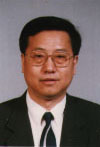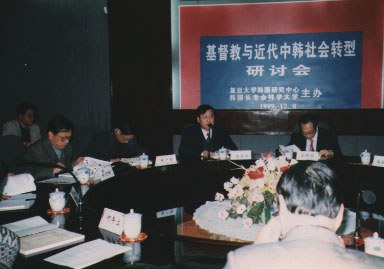The Center for Korean Studies at Fudan University, in Shanghai, was established after China and South Korea established bilateral diplomatic relations in the early 1990s. In 1988, noted South Korean Sinologist Kim Jun-yop visited Fudan University and discussed with university officials various ways of promoting cultural and academic exchanges between the two countries. The university opened its new Center for Korean Studies two months after Beijing and Seoul formally established diplomatic relations in August 1992.

The Center, which has received financial support from the Korea Foundation since 1994, has been involved in a wide range of academic activities while being recognized as a leading research institute devoted to the promotion of Korean studies in China. The Center currently has five full-time assistant researchers and 40 non-tenured research fellows, most of whom are faculty members of the university's political science, economics, history, philosophy, journalism, international relations, and sociology departments. Also involved in the Center's research activities are scholars from the Shanghai Academy of Social Sciences and other institutions of higher learning throughout the country. Although many of the Center's research fellows are affiliated with other organizations, all are required to undertake specific research projects.
Since its founding, the Center has organized 25 domestic and international academic events and published 33 academic monographs. This academic and research activity has drawn global acclaim from Chinese and foreign academic circles.
Research on Korean Independence MovementPriority in the Center's activities focuses on Korea's colonial-period independence movement, when Korean leaders established a provisional Korean government in Shanghai. Along with the National Institute of Korean History, the Korean Ministry of Patriots and Veterans Affairs, and the Research Association of the Korean National Movement, the Center has hosted two international seminars and several domestic academic conferences, published 10 monographs, and has assisted post-graduate students in completing five bachelor and doctoral theses, thereby making a significant contribution to the promotion of studies on the Korean independence movement.
The Center's research achievements include "Studies on the Chinese Communist Party's Support for Korea's Independence Movement," "Studies on the Shanghai Provisional Korean Government," and "Assessment of the Korean Independence Movement and Studies on the Unification of the Korean Peninsula." These works have had a significant impact on the study of the Korean independence movement within South Korea. Moreover, the two-volume's "Collection of Historical Material Relating to Korean Organizations in China," published by the Center and now preserved in the Archives of Shanghai, and "s Pertaining to the Korean Independence Movement and Selected Chinese-Korean Historical Material" have received acclaim from academic circles as important material on Korea's struggle to gain independence from Japanese colonial rule.An additional focus of the Center's academic activity involves Chinese-Korean relations. Ten research projects are currently in progress, including monographs on ?orea? Modern-day Diplomacy and China,"The Korean Community in Shanghai," "Diplomacy of Late Qing Period and Korea's Opening to the Outside World," "Li Hung-chang and Chinese-Japanese-Korean Relations," "Chinese-Korean Relations since China's Ming and Qing Periods," and "Comparative Studies on General Public Acceptance of Western Literature in Japan and Korea." In addition, the Center has produced a number of academic papers that have helped to promote studies on China-Korea relations.
Focus on Korean Culture and HistoryA third focus of the Center concerns studies on Korean history and culture. A study of world history led by Professor Zhang Xichang has already won acclaim from Chinese academic circles, and lays down the groundwork for future in-depth studies on Korean history and culture.
The Center has also published a number of detailed studies including "The Chronology of Zoning Administrative Districts of the Joseon Dynasty" and "Christianity in Modern-day Korea: Studies on Dissemination of Culture and Educational Activities." In addition, the Center has promoted a 12-episode television program on Korean literature and organized an exhibition of works by noted Korean calligrapher Jeong Sang-ju. Meanwhile, the Center has also organized, in cooperation with Presbyterian College and Theological Seminary, a host of symposiums regarding comparative studies on the Christian culture of China and Korea over the last six years. Moreover, the Center hosted the Fourth International Seminar on Traditional Korean Culture, in which about 100 scholars from China, Japan, and Korea participated.
 |
A Seminar on Korea-related Topics Organized
by the Center for Korean Stdueis of
Fundan University |
Another focus of the Center concerns present-day Korea and Korean peninsula questions. With an interest in both modern-day issues and global problems, the Center has published a number of works concerning "Studies on Korea's Industrial Policy," "Changing Korean Politics," "Korea's Political System," and "Policy Analysis of Korea's Prominent Economic Development."
Conferences on Korean Peninsula QuestionsFurthermore, the Center annually invites Chinese and foreign specialists to discuss developments on the Korean peninsula, and presents various policy recommendations and reports to related government agencies.
In June 2000, on the 50th anniversary of the outbreak of the Korean War, the Center conducted extensive research activities and seminars on this event. The Center also held discussions with diplomats of the French Embassy in Beijing in September of that year regarding the question of the European Union's diplomatic recognition of North Korea and the latest developments on the Korean peninsula.
Meanwhile, in October the Center took part in a China-Korea seminar on "The Division of the Korean Peninsula and Reunification in Dandong," where seminar participants engaged in vigorous discussions on various topics relating to the Korean peninsula. The following month, the Center held discussions with South Korea's Ministry of Unification on the direction of Seoul's policy toward Pyeongyang after the inter-Korean summit.
Last December, the Center organized a seminar on "The International Politics of Northeast Asia" together with the Chinese Association for Korean Studies in Taiwan and an Asian studies center in Hong Kong. The forum provided scholars from China, Taiwan, and Hong Kong with a valuable opportunity to exchange views on Korean issues and international relations in Northeast Asia.
Scholars from six countries--China, Japan, Russia, North and South Korea, and the United States--took part in an international seminar on the Korean question after the Cold War. This event was the first international forum held in China in which scholars from these six countries were able to meet and discuss the Korean question. During the same month, the Center also held talks with U.S. State Department officials about economic reform in North Korea.
In June 2001, the Center organized a seminar on "The Korea Policy of the Bush Administration," which allowed scholars and researchers from various countries to exchange opinions while promoting the reputation of the Center among policymakers and scholars around the world. The conference also helped to ameliorate Beijing-Seoul relations.
Since 1994, the Center has also offered consulting services to Korean companies that have invested or planned to invest in China on the overall business and investment climate in Shanghai, thus helping to increase business ties between the two countries.
Fostering Korean Studies ScholarsThe Center has also devoted itself to training post-graduate students. The Center has extended scholarships to 211 bachelor and doctoral degree candidates for the last seven years with financial support from the Korea Foundation, with 14 earning bachelor degrees and 11 doctoral degrees. Beginning in 2002, the Center will formally recruit Ph.D. candidates in Korean studies from China and other countries upon approval from Fudan University.
The Center is currently expending considerable effort to increase its collection of important books and historical s. To this end, the Center aims to become a hub of Korean studies in southern China. As a result, the Center has so far collected some 10,000 volumes relating to North and South Korea with the financial support of various outside organizations. The Center? collection is open to scholars from a range of academic disciplines, and it eagerly welcomes book donations from individuals and research organizations alike.
In addition to the Korea Foundation, the Center solicits donations from other institutions in Korea, Japan, and the United States. The Center also maintains academic exchanges and conducts joint research with a number of organizations in China, Japan, Korea, Russia, and the United States. Based on these achievements, the Center endeavors to begin a new chapter for Korean studies in China in the 21st century.
 한국국제교류재단
한국국제교류재단 newsletter
newsletter











